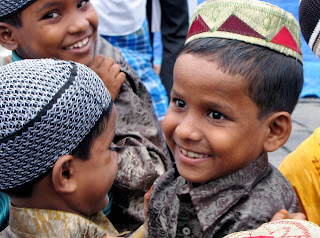TNN, Sep 12, 2010, 12.00am IST
Fifteen-year-old Nayana Dasgupta is caught in an identity crisis and can't figure out whether she is a Bengali or Kannadiga!
I am what people call a Probaashee Baangali, or a Bengali settled anywhere away from West Bengal. In such a situation, one has to face many contradictions. On one hand, one has to adapt to the culture of the place you live in and at the same time, retain your ties to West Bengal. To worsen my state (funny I should use that particular word!), I was born in Bangalore and have lived here all my life. So, I have the task of enriching my Bengali culture as well as having to appreciate the culture down South.
So far, I have been able to balance both cultures and I may state without any hesitation that I like, rather love being a Bengali as well as a Bangalorean. But, on the path to maintaining equilibrium, one scale sometimes seems to weigh a little more than the other.
For example, I am very fluent in my mother tongue, Bengali. But I am officially illiterate in that language as I can neither read nor write it. On the other hand, I have learnt Kannada in school for four years (and have done pretty well in my tests!). I can read and write Kannada, thanks to my teacher, but am not as fluent. My friends and I, however, converse in Kannada sometimes and I too contribute generously in these conversations, with a few grammatical errors, of course!
My relatives in Kolkata are not exactly distraught about me not being able to read or write in Bengali, but ask me, "I assume you are learning Bengali as well?", to which I sheepishly smile and my parents say, "She has a lot of studying to do — you know, the pressure!" An enthusiastic uncle also sent me several Bengali textbooks from Kolkata. Slowly, he too realised that it was of no use. No one asks me the question any more.
As a result, I compensate for my incompetence in my mother tongue by learning Rabindra Sangeet with my aunt's 55-year-old harmonium. And to add feathers to my half-Kannadiga status, I can say that I love bisi bele bath more than any 'Baangali' khichudi and I prefer buttermilk over mishti doi.
One of my classmates has lived in several districts of West Bengal and is well-informed about Bengali culture despite being a Kannadiga. One of her favourite series of books is Feluda, whereas I quite enjoy reading Malgudi Days. She likes rice payesh (a well-known Bengali sweet) and I like nothing but sheemayer paayesh. Though my choice sounds more Bengali, her choice is more liked among Bengalis. She too is often surprised as to how my preferences differ from the average Bengali — for an ideal Bengali exists no more. Therefore, we have concluded that I should have been a Kannadiga by birth. I too often consider that this would have been a wiser decision by the Almighty. Things would have been much less complicated.
For example, once, when I had been to Kolkata for a cousin's wedding and was complaining that Bangalore was a much better city to live in, my mother gave me a stern lecture and the finality in her tone made my heart sink. She simply said, "This is your culture and your own state. You just have to accept it." I remember that I just looked up at the high ceiling of the room and inwardly wailed out a cry of frustration. I wondered wildly,
" Who am I? Where am I from?" The question still haunts me.
While I just can't stop liking kosambi, idli, rava idli, dosa, I just can't leave shorshe bata maach or shukto!
However, I have been somewhat able to manage the situation, since Bangalore is now Bengalooru. No finer name could have been given to this city — Bengal - ooru!
And, if none of these tricks work, I'll just say I'm a Bengali and talk in Hindi to strike a balance!



